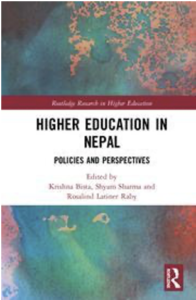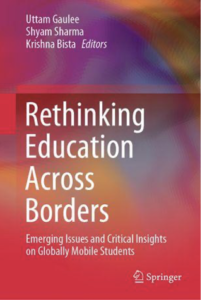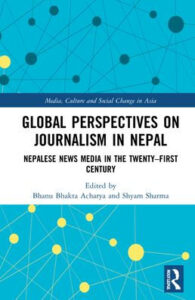देश बाहिर बसेर अध्ययन गर्ने वा बिभिन्न पेशामा कार्यरत नेपालीहरुलाई खासगरी सामाजिक संजालका सम्बादहरुमा “विदेशमा बसेर बाठा कुरा गर्ने” भन्ने आरोप लागेको देखिन्छ ।बाहिरै बसेर पनि योगदान दिन चाहने/सक्नेहरुको संख्या बढ्न थालेको धेरै समय नभई सकेकोले पनि त्यो तर्क देख्न सुन्न पाइएको होला । तर आफ्नो ज्ञान र शीपको क्षेत्रमा धेरथोर योगदान दिनेले त्यसबारे हल्ला गर्न पनि अप्ठारो, थाहै नदिँन पनि अनुचितको बिलखबन्द हुन्छ । त्यहि अप्ठारो बीच मैले तलको सुची बनाएर आफुले नेपाली शिक्षा जगतमा योगदान दिएका प्रोजेक्टहरु बारे आफ्नो “नेपाल रेजुमे”को शुरुवात गरेको हुँ । यो अपुरो र यसको लेखाई अधुरो छ, समय निकालेर सुधार्नु पर्ने छ । तै पनि अरु साथीहरुलाई यसले प्रेरित गर्ला भन्ने आशाले तयार पारेको हुँ । सन् १९९२ मा भारतमा विद्यालय शिक्षा हासिल गरेर स्वदेश फर्केपछि सन् १९९४ देखि २००६ सालसम्म बुटवल र काठमाडौँमा विद्यालय र विश्वविद्यालयमा शिक्षण र प्राज्ञिक सेवा गर्ने अवसर पाएको हुँ । नेपालमा सार्वजनिक विश्वविद्यालयको सौभाग्य/अवसर नपाएको भए उच्च शिक्षा र त्यसमा आधारित रोजगारको अवसर उपलब्ध हुने थिएन, न त २००६ सालपछि संयुक्त राज्य अमेरिकामा थप अध्ययन गर्न आए पछिका दिनमा नै । त्यस अवसरकालागि र आफ्नो मातृभूमिप्रतिको कृतज्ञता जाहेर गर्न पनि मैले तलका योगदान गर्ने र तिनलाई यहाँ प्रतुत गर्ने जमर्को गरेको हुँ। यसलाई हेरिदिनुभएकोमा मेरो हार्दिक धन्यवाद!
TRAINER/FACILITATOR/PRESENTER
*80+ op eds mainly on higher education for a column in Republica (reposted on this site as original links seem to break after a while)
89. Resource person, December 2023-February 2024, Teacher-centered training for student-centered teaching (using the “expertise cycle” concept), training 60 teachers from 9 schools across Nepal. (program info)
88. Resource person, July-October 2023, Teacher-centered training using the “expertise cycle” (where practitioners study, practice, observe, share, and document classroom-based self-training and process of being experts): training 30 teachers from 4 schools in Kathmandu, Pokhara, and Syangja (resource book).
87. Talk: “(Academic) Literacies in the University of Nepal Curriculum,” a discussion for the university development board of a proposed public university, September 2022.
86. Resource person, Tribhuvan University Center for International Relations, TU Global Initiative, a program for connecting diaspora Nepali scholars with scholars on the ground, 2021-23.
85. “सम्बोधन, समय, र समाधान” (Formalities, Time, and Solutions–an essay on waste of time in social/professional events in Nepal), Kantipur Daily, Baisakh 30, 2080.
84. “Policy Communication: Communicating Specialized Knowledge with General/Mixed Audience,” a 2-hour workshop organized by Dr. Purna Nepali, Kathmandu University School of Management (KUSOM), April 2022.
83. Coauthored with Subhash Nepali. “न्यायकालागि दलित लेखन,” झन नयाँ, नयाँपत्रिका, Aug. 7, 2019.
82. Writing for Social Justice, a 3-month workshop series/course to support Dalit and other activitists/scholars with writing op-eds that are more research- and analysis- based toward making more significant impact on public discourse and policy related to social justice for Dalit community and broader social change, supporting Subhash Nepali to develop the course and co-facilitating with him and other colleagues (Lina Gurung, Gauri Nepali, Shiva Hari Gyawali, and Leena Dahal), April-June 2022.
81. Director, Facilitator, Scholars Training program, Society of Transnational Academic Researchers — a significant number of trainees have been from Nepal.
80. Co-authored with Khim R. Subedi and Krishna Bista. “Academic Identity Development of Doctoral Scholars in an Online Writing Group,” Informing Science Institute – International Journal of Doctoral Studies. Vol. 17, 2022, pp. 279-300.
79. Scholars’ Accountability Group, a weekly peer-feedback meeting series, led by Chandra Upadhyay and other scholars of Tribhuvan University, for scholars of TU and beyond from across the country, March-April 2022, supported development of the program.
78. Global Perspectives on Journalism in Nepal: Nepalese New Media in the 21st Century, a book including 18 chapters by journalism and media from across Nepal and a few abroad, edited with Bhanu Bhakta Acharya. Routledge, 2022.
77. Adaptive Design: Engaging Students in Disrupted Distance Learning, a workshop for 50+ faculty members of Kathmandu Model College Network, February 2022.
76. Paper (with Nasrin Pervin, Surendra Subedi, and Pratusha Bhowmik): “Advancing Knowledge Enrootment: Diversifying Scholarship in/for the Global South,” Comparative Education Society of Asia (CESA) Conference, Kathmandu University, September 2021.
75. Tribhuvan University Professional Development Workshop series (2021): Served as a resource person and coordinator for a faculty development initiative, including workshops on development of research agenda and social-impact objectives, mobilization of diverse languages and genres for public engagement, teaching excellence through research integration, and pursuit of new professional development objectives.
74. Tribhuvan University webinar, Research & Writing Support Group, 3-month long modular weekly milestones (Sept.20, Dec 20 – Feb 21).
73. 12-week writing support program: “South Asia Writing Group,” supporting a group of 24 scholars from across Nepal, India, and Bangladesh, March-April 2020.
72. Little Angels’, “Learner Engagement During Disrupted Distance Learning,” Sept. 29, 2020 (facilitated with Dr. Smrittee K. Panta)
71. Open University of Nepal, “Research and Writing as Knowledge Production, a workshop for English Studies students, Sept. 19, 2020 (organized with Tara P. Adhikari)
70. Opening Doors with Social Science Education, Golden Gate College, a panel and Q&A for college students pursuing higher education in the social sciences (with Prof. Shiva Bhusal and Ms. Moon Gurung).
69. Brain Gain Center webinar (May 2020)– helped develop, facilitate, and participated in the panel for the first session of a webinar discussion series —
68. Tribhuvan University Webinar (April-May2020): presented “critical perspectives on online education” for a panel discussion and discussion with TU leaders (including address by Education Minister)
67. Tribhuvan University Teacher Training (April 2020): trained a group of 24 TU professors and organized training for 500+ TU professors from across Nepal (स्वयंसेवी समुहले संचालन गरेको यो वृहत कार्यक्रममा शिक्षामन्त्रीले दिनुभएको मन्तव्य बारे कान्तिपुर दैनिकको समाचार)
+“Critical perspectives,” Conclusion of faculty training for teaching online, organized by a grassroots community of Tribhuvan University, Nepal (also supported as facilitator of the 2 week program that trained 500+ faculty members)
66. King’s College Conference session (April 2020), Keynote — “Embracing Chaos: Virtual Conference on Online Teaching” (King’s College, Kathmandu)
65. Keynote, “Leveraging Agency.” Kathmandu Model College, Nepal (2019), with Cynthia Davidson and MaryAnn Duffy
64. KMC Orientation session (April 2020) for unit/institutional leaders of Kathmandu Model College (and network)
63. Martin Choutari Discussion — co-facilitated (with Subhash Nepal) workshop on writing for social justice, Martin Choutari (June 2019)
62. Trihuvan University (2016-17): Webinar Series (monthly teacher training workshops): Tribhuvan University (October 2016-July 2017)
61. ^^Ditto @KMC: webinar series Kathmandu Model College and Network
60. Writing for Social Justice, Op-Ed writing “course,” supported Subhash Nepali to develop and implement, organized with similar support from Dr. Tom Robertson at the Fulbright Center, Kathmandu.
59. Tribhuvan University Webinar Series (2017-18, monthly teacher training workshops): Tribhuvan University (September 2017-May 2018)
58. ^^Ditto @KMC: Kathmandu Model College and Network
56. Tribhuvan University two-day teacher training retreat/summit (Bhaktapur, May 2018): Tribhuvan University — trained trainers, helped organize and facilitate program, presented a keynote
57. ^^Ditto @KMC: Kathmandu Model College and Network
56. Tribhuvan University two-day teacher training retreat/summit (Nagarkot, May 2019): Tribhuvan University — trained trainers, helped organize and facilitate program, co-presented a talk on research advancement and integration (with Dr. Binil Aryal and Dr. Krishna Bista)
55. ^^Ditto @KMC: Kathmandu Model College and Network
54. News 24 interviews — 2 interviews about higher education and contribution of diaspora scholars
53. NELTA talk, 2016 — on the potentials for advancing Writing Studies and Writing Education within the framework of ELT in Nepal
52. Applied linguistics conference, TU CDEE, 2018 (?) — on the role of teachers as micro-level policy makers and practical translators of curricular policy
51. Two-day writing for social justice workshop (Butwal, June 2019) — a series of workshops for integrating autoethnography and research for writing to influence social policy and public engagement
50. Little Angels’s, faculty development framework workshop (June 2019) — with Krishna Bista — a workshop engaging faculty and administrators for adapting/developing a framework for rewarding faculty teaching, research, and academic/community service
49. Toronto Conference, Role of Diaspora in Higher Education in Nepal, Presented a paper on BGC (concept and promotion)
48. New York, BGC Concept and Recommendations (during visit by DPM Ishwor Pokharel)
47. BGC presentation in Kathmandu — at launching (May 31, 2019)
46. Online workshop series on publishing research-based article for 24 scholars from across Nepal plus India and Bangladesh and across the disciplines (in collaboration with Surendra Subedi), Feb 2-020 – Apr 2020. “Publishing Your Research/Scholarship: Taking Ambitious & Purposeful Approaches to Product, Process, and Politics”
45. Online workshop series on publishing research-based article for 12 scholars from across Nepal and across the disciplines (in collaboration with Dr. Prem Phyak), Nov 2019 – Jan 2020.
44. Online workshop series on publishing research-based article for 12 scholars from King’s College (in collaboration with Anuj Tiwari), Aug 2019 – Dec 2019. “Publication Based on Empirical Research”
43. Webinar series and on-the-ground training, Tribhuvan University, Nepal (assisting implementation of semester-based teaching/learning through monthly online sessions, leading up to summer programs), Nov. 2016 – 2017.
42. Kathmandu Model College, similar to or overlapping with TU, Nov. 2016 – 2017.
41. Monthly online teacher training webinars, leading to a 3-day onsite training in August 2016, Midwestern U., Nepal, Oct. 2015 – June 2016.
PUBLICATIONS
40. Sixty plus op-ed articles (as of February 2019) for Republica, for a column on higher education and society, July 2014-Present.
39. Book: Co-edited with Bista, K. & Raby, C: Higher Education in Nepal: Practice, Policy and Perspectives. (Expected publication: Fall 2019).
38. “Realigning Higher Education.” In Bista, Sharma, Raby eds. Higher Education in Nepal: Policies and Perspectives, Routledge, 2019.
37. Co-authored with Krishna Bista and Rosalind L. Raby: “Introduction: Telling stories, generating perspectives: Local–global dynamics in Nepalese higher education.” In Bista, Sharma, Raby eds. Higher Education in Nepal: Policies and Perspectives, Routledge, 2019.
36. Co-authored with Sudha Tripathi and Surendra Subedi: “Making the shifts to change the system: Implementing the semester system through pedagogical training in Tribhuvan University.” In Bista, Sharma, Raby eds. Higher Education in Nepal: Policies and Perspectives, Routledge, 2019.
35. Co-authored with Krishna Bista and Rosalind L. Raby: “Conclusion: Complexities of higher education in Nepal” (with Rosalind L. Raby & Krishna Bista). In Bista, Sharma, Raby eds. Higher Education in Nepal: Policies and Perspectives, Routledge, 2019.
34. Chapter: Co-authored with Surendra Subedi: “Semester System in Nepal: Taking a Collaborative, Constructivist Approach to Teacher Training.” Tribhuvan University Journal, 2018.
33. Article: “Translanguaging in Hiding: Effects of English-Only Instruction on Education in Nepal.” In Transnational Writing Education: Theory and Practice. Ed. Xiaoye You. Routledge, 2018.
32. Chapter: “Third Eye: An Exhibit of Literacy Narratives from Nepal.” In Stories that Speak to Us: Exhibits from the Digital Archives of Literacy Narratives. Eds. Cynthia Selfe et al. Utah: The University of Utah Press imprint, 2012
31. Chapter: Co-authored with Bal K. Sharma. “Global Popular Culture and Literacy Practices of Nepalese Youth Online.” In ScreeningLiteracy Across Cultures. Eds. Bronwyn Williams & Amy Zenger. London: Routledge, 2012.
CREATIVE WRITING
30. Dukhirahane Desh(a collection of poems in Nepali), Kathmandu: Sunlight Publication, 2006.
ONGOING RESEARCH
29. Book project: “Writing Education in South Asia: Obstacles and Uptakes.” (2018-20)
GRANT PROJECT
28. “On Their Own Terms” (2016-18),a study of writing pedagogies and engagement of global perspectives in Romania, Colombia, India, Nepal (grant: National Council of Teachers of English, US).
TEACHING EXPERIENCES
27. Lecturer, Tribhuvan University, Central Department of English, Nepal, 2000-2006.
26. Lecturer, TU Colleges: Padma Kanya College, Ratna Rajya Laxmi College, Nepal, 2001-2006
25. Lecturer, TU-Affiliated Colleges: Kathmandu Model College, Campion College, Kathmandu Don Bosco College, Nobel College, Nepal, 2000-2006
24. Teacher, Schools: GEMS (high school), 1998-2000; Universal Academy, 1997-98, Kathmandu; New Pinewood School (elementary & middle school), Butwal, Nepal, 1994-97.
PRESENTATIONS (PAPERS, WORKSHOPS, KEYNOTES)
SECTION TO BE UPDATED …
27. Keynote (with Cynthia Davidson & MaryAnn Duffy): “Using Research for Leveraging Education” part of joint keynote titled “Leveraging Agency: Using Writing, Technology, and Research to Drive Educational Transformation,” Kathmandu Model College
26. Talk (with Binil Aryal & Krishna Bista): “…”
25. Workshop: KMC, 2018 …
24. Workshop: TU, 2018 …
23. Paper: “Teachers as Curriculum Designers and Micro-Level Policy Makers.” (virtually presented) Annual ELT and Applied Linguistics Conference, School of Education, Tribhuvan University, Kathmandu, Nepal, Feb. 10, 2018.
22. Workshop: “Working with Sources: Strategies for Developing & Sustaining Your Research Agenda,” with Drs. Gene Hammond & Santosh Khadka, Tribhuvan University, Kathmandu, Nepal, Aug. 9, 2016.
21. Talk: “Get Inspired.” United States Education Foundation, Kathmandu, Nepal, Aug. 2, 2016 +++ add 2018 & 2019 talks.
20. Keynote: “Making Transformations: Growing by Giving.” Transformations: An Educational Summit. Midwestern University, Surkhet, Nepal, Jul. 25, 2016.
19. Lecture: “The Place of Writing Education in ELT: A Case for Nepal.” Nepal English Language Teachers’ Association, Kathmandu, Nepal, Aug. 13, 2016.
18. Talk: “Writing Studies and Writing-Intensive Pedagogy Across the Curriculum.” Tribhuvan University, Kathmandu, Nepal, July 17, 2016.
17. Roundtable (led discussion with provost and eight deans of Tribhuvan University): “Implementing and Improving the System in Nepal.” Kathmandu, Nepal, Aug. 15, 2016.
16. Talk: “Beyond Binaries: Teaching as Lifelong Learning.” Kings College, Kathmandu, Nepal, Aug. 11, 2016.
15. Talk: “Developing Your Research Agenda.” Kathmandu University, Kathmandu, Nepal, Aug. 15, 2016.
14. Paper: “Establishing a Writing Center” (a concurrent session training tutors and director). Transformations: An Education Summit. Midwestern University, Surkhet, Nepal, July 24, 2016.
13. Paper: “Global Popular Culture & Literacy Practices of Nepalese Youth Online.” CCCC, Atlanta, GA, Apr. 8, 2011.
12. Paper: “Navigating Epistemological Worldviews: Nepalese Graduate Students in Rhetoric and Composition Programs in the US.” CCCC, Louisville, KY, Mar. 18, 2010.
11. Paper: “Perceptions and Perspectives: The Journey of Knowledge in Abhi Subedi’s Fire in the Monastery.” Conference of the Literary Association of Nepal, Kathmandu, Nepal, Mar. 2, 2005.
10. Paper: ELT Conferences, NELTA, Nepal, 1998, 1999, 2003, 2005, 2006.
ACADEMIC AWARDS/RECOGNITION
9. Certificate/Appreciation, from Rector Prof. Dr. Sudha Tripathi, for facilitating faculty training programs, May 2019, Nagarkot.
8. Nepal Vidya Bhusan (then “Mahendra Vidya Bhusan”), Gold Medal, Royal Palace, Kathmandu, Nepal, Mar. 2000.
7. Diligence Scholarships while studying MA, Tribhuvan University, Kathmandu, Nepal, 1997-99; while studying BA, Butwal Multiple Campus, TU, Butwal, Nepal, 1994-96.
6. Award, National Essay Writing Context, Central Bank of Nepal Tribhuvan University, Kathmandu, Nepal, 1994-97
PRIOR SERVICES
5. Editor(1 of 5),Journal of NELTA (Nepal English Language Teachers’ Association), Nepal, 2009-13.
4. Editor(1 of 4), ELT Choutari, blog-based monthly magazine on English Language Teaching, read by English teachers around the world; 2009-12. (about 10 editorials).
3. Co-founder, Editor, ELT Choutari, blog-based monthly magazine on English Language Teaching, read by English teachers around the world; edited with 3-6 co-editors, 2009-13.
MEMBERSHIP
2. Life member: Literary Association of Nepal, Nepal, 2003-
1. Life member: Nepal English Language TeachersAssociation, Nepal, 2000-







